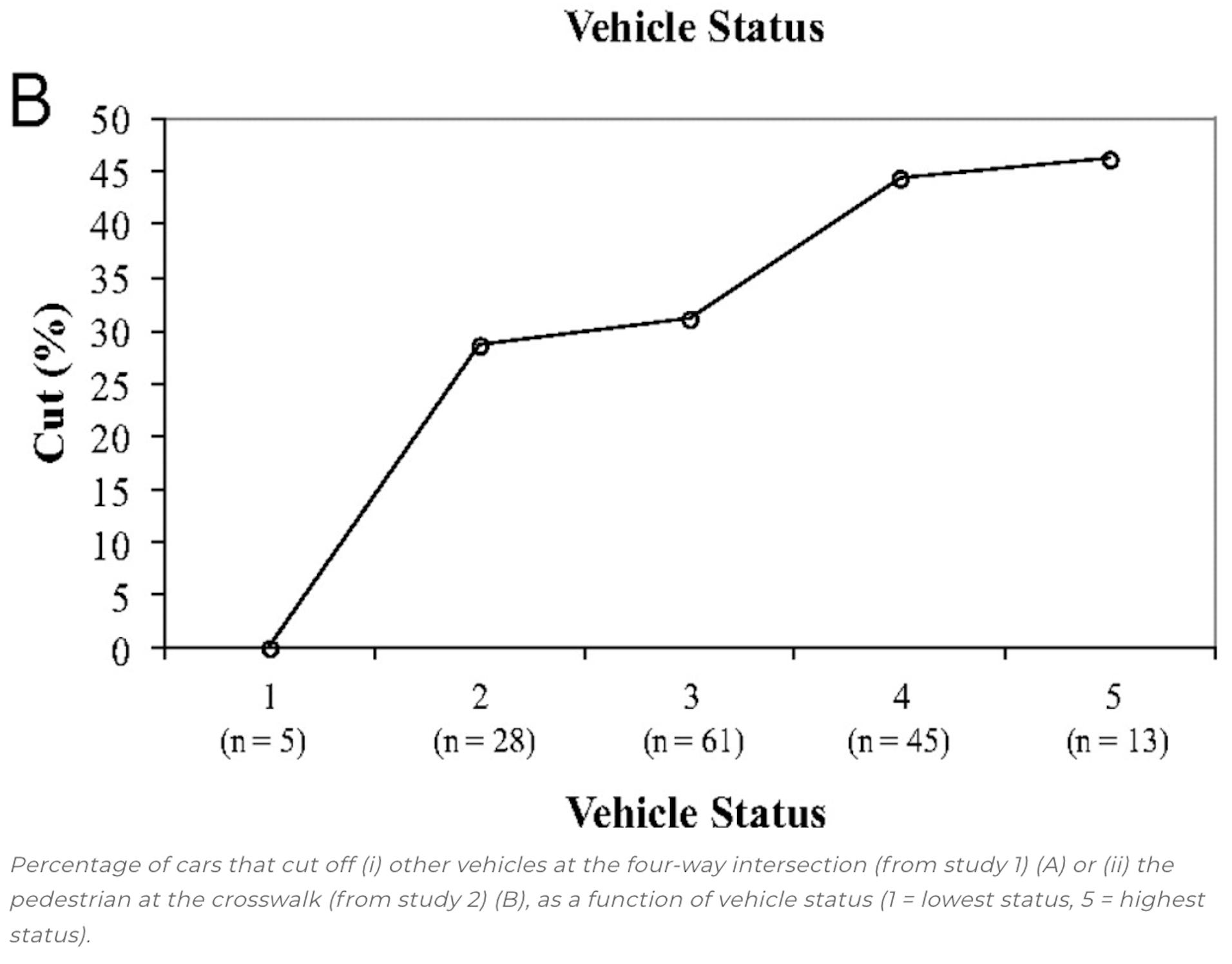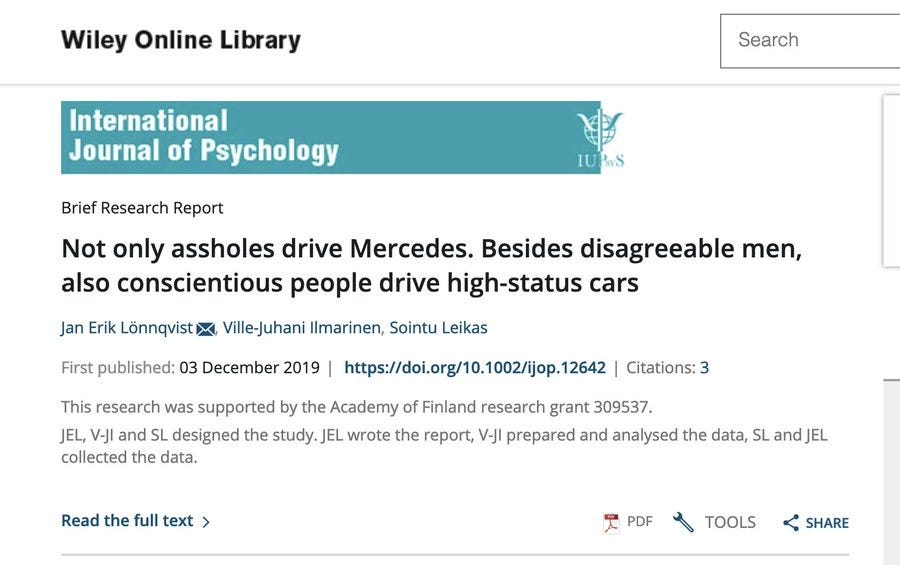The Audi Effect
Does driving a "luxury" car make you a jerk? Survey says: Yes!

It is a truth universally acknowledged, at least by those of us who ride bicycles in the city, that drivers of expensive cars should be given a wide berth, if not avoided altogether. My own observations, which are entirely anecdotal, include the following:
- They rarely signal when turning or changing lanes.
- At any 4-way intersection, they will be the first to surge forward.
- When passing cyclists, they will refuse to yield an inch of road space, and indeed pass so close that one suspects their intention is to teach a lesson, if not drive a perceived competitor into the gutter.
I find it useful, as a cyclist and walker in the city, to look at car traffic as a kind of faceless Juggernaut. There may be living human actors encased in those two-ton boxes of glass, plastic, and steel around me. (It’s hard to tell: many drivers are now invisible to outside viewers, hidden behind aggressively tinted glass.) When I do venture a glance, I often see their occupants gazing down at their smartphones.
I’ve come to think of myself as a fleet-footed mammal among fossil-fuel-guzzling dinosaurs; my ongoing survival depends on being able to identify the ones that can kill me, and take the appropriate evasive action. Drivers of electric cars, hybrids, and Volvos I class with the herbivores—if they kill you, it will likely be an accident, the way a brontosaurus might have crushed Purgatorius, or other proto-primate, underfoot while browsing among the reeds.
There are three makes of car that I class with the tyrannosaurs: Mercedes, BMW, and, above all, Audi. Particularly when the car in question has a black paint job. Then, I consider myself to be in the presence of active malevolence. If I encounter a black Audi when there are few witnesses around—say when I’m riding my bicycle up Mont-Royal, the park in the center of my hometown of Montreal—I often deem it prudent to pull over, and wait until the coast is clear.
Digging deeper, I’ve found that my observations are confirmed by a University of Michigan study published in the Proceedings of the National Academy of Sciences1 entitled “Higher social class predicts increased unethical behavior.” In addition to a whole bunch of other nastiness, owners of soi-disant luxury cars were found to be three times less likely than drivers of “lower status” cars to give pedestrians the right of way, and four times more likely to cut off other drivers.

When I posted this on social media, I got a lot of NSS (No Shit, Sherlock) responses, and some ironizing about social scientists squandering research funds to confirm the obvious. Many European readers objected that, where they lived, Mercedes, BMWs, and Audis weren’t considered high status cars. (The mind boggles—in Germany, the fatherland of the luxury driver, is every driver then an Arschloch?) Amusingly, at least to me, there is a more recent study out of Finland entitled: “Not only assholes drive Mercedes.” The subtext being: Joo, you’re right though, most of them are a-holes.

Are there any conclusions to be drawn from this, apart from the obvious, survival-related ones? Here’s my takeaway. Cars are one of the ways people display status. (My doctor friends tell me there’s a whole hierarchy of Mercedes makes, from intern to surgeon to administrator, in hospital parking lots.) They are also a manifestation of “status anxiety,” which philosopher Alain de Botton defines thus: “a worry, so pernicious as to be capable of ruining extended stretches of our lives, that we are in danger of failing to conform to the ideals of success laid down by our society and that we may as a result be stripped of dignity and respect; a worry that we are currently occupying too low a rung or are about to fall to a lower one.”
As everyone knows, an Audi is not-quite-as-good as a Mercedes or BMW. (Ooooh, you almost made it to the executive bathroom. Sad face, keep on trying!) And, as everyone also knows—deep down, anyway—choosing to drive a car this far into the 21st-century climate crisis is just a wee bit anti-social. Nihilistic, even. You’re saying: I’ve heard about these wildfires, flash droughts, and atmospheric rivers, but—I really, really want to keep going to Costco. (Or my cottage. Or hockey practise. Please don’t let me stop you—I’m making a collection of rationalizations for car ownership.) Drivers of “luxury” cars are saying: I’ve chosen my lane, and you better not get in my way, you self-righteous pedestrians and cyclists, because I don’t care if I take a few of you down on my way to hell. (The drivers of SUVs, Hummers, and non-work pick-ups, in contrast, seem to be expressing existential anxiety, based on protecting themselves and their families in a world they perceive as dangerous, and which is becoming more dangerous because of their transport choice. But that’s a whole different topic...)

There is a subset of cyclists who are obsessed with status. They’re known as MAMALS (middle-aged-males-all-in-Lycra), and, if you drew a Venn diagram, they would likely intersect with drivers of Audis and other fancy cars. I tend to avoid their company, because they are boring.
But the vast majority of cyclists just want to get around town, without being crushed. It’s springtime, and the streets of Montreal, and many other cities, are filling up with bike-riders, many of them on Bixis, as our local bikeshare system is known here. Many of them seem to be new to cycling. Some advice, from one who’s been tangling with the tyrannosaurs all his life. Remove ego from your riding; it’s better to get around safely, than to get into a pissing contest with the operator of a deadly machine. Always be courteous to pedestrians: they are your friends, allies, and quite possibly, your neighbors. Never cycle angry. And always watch out for the Audis—especially the black ones.
I hope you’ll consider becoming a paid subscriber to my Straphanger newsletters. Almost everybody who’s signed up so far is a “free rider.” No shame in that! But to keep this train going, I’m going to need at least a few people who are willing to help out by chipping in, even with a low-priced monthly subscription. (I’m talking the price of two rides on a bikeshare bicycle here!)
https://www.pnas.org/doi/10.1073/pnas.1118373109 ↩
